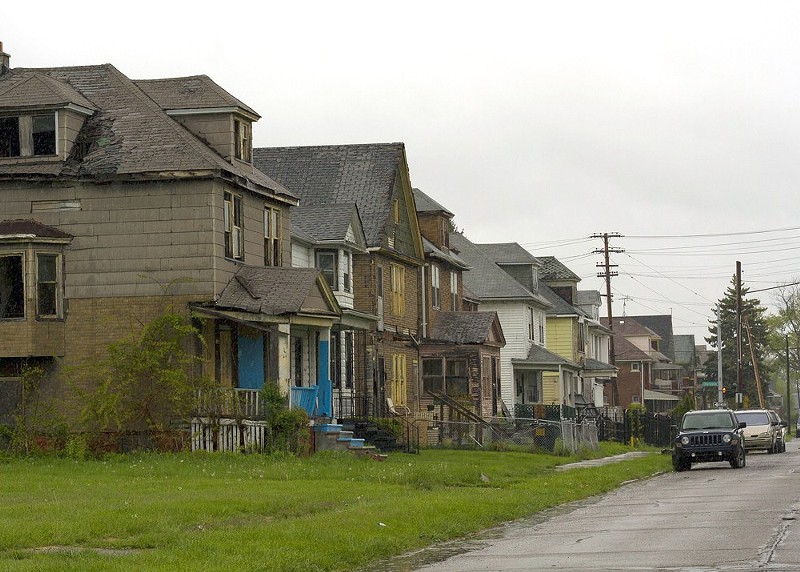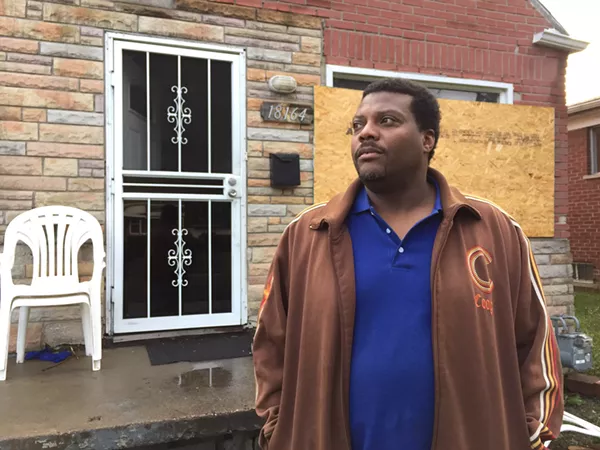
Steve Neavling
A row of dilapidated houses at Crane and Charlevoix on Detroit’s east side. Eleven houses on this block have been foreclosed since 2002.
In July 2016, the ACLU of Michigan and the NAACP Legal Defense Fund sued the city of Detroit and the Wayne County Treasurer in the wake of the largest tax foreclosure crisis since the Great Depression. Despite salient arguments about unconstitutionally over-assessed properties, disparate negative impact on African-Americans, and violation of due process rights, there has been no relief for two years. The suit against the Wayne County Treasurer was dismissed, and the suit against the city had been in stalemate. Just in the time since the lawsuit was filed, approximately 7,000 occupied homes in Detroit have been foreclosed, and another 2,000 are in the auction queue this year.
Relief came Tuesday. Detroit City Council approved a settlement agreement with the ACLU regarding low-income homeowners who were being foreclosed upon for taxes that they legally could have been exempt from paying. Advocates and residents alike know all too well that many people have lost their homes because they did not know about the poverty exemption (which lowers or eliminates taxes for low-income owners) or couldn’t successfully apply for it due to unduly burdensome requirements and procedures.
The settlement includes improvements to the city’s “poverty tax exemption” program that are aimed to make it easier for low-income homeowners to claim their exemption. Moving forward, the city is required to notify owners of homes worth $95,000 or less about the poverty exemption in an annual mailing and put the application online. But this relief comes too late for the homeowners who lost their homes this year. Fortunately, the settlement also has a provision for low-income homeowners who are currently in tax foreclosure: They will have the opportunity to buy back their homes for $1,000. This aspect of the settlement is being implemented through an innovative program run by the tax foreclosure prevention project (TFPP) team at United Community Housing Coalition (UCHC) and Michigan Legal Services (MLS).
Since 2003, TFPP has run a program to help residents of foreclosed homes buy back their properties in auction. Beginning with “seed money” drawn from the private accounts of two visionary, generous lawyers, the TFPP has enabled over 3,000 residents to buy the homes they live in, mostly through tax foreclosure auction purchases. This service mitigates the worst social consequences of the auction, which include permanent displacement and blight.
Despite this program’s powerful impact, it operates within a very harsh auction system. For years, most homes did not sell in the first auction, and could be purchased back for as little as $500. In recent years, the auction has gotten increasingly competitive, and occupied homes are often targeted by speculators. Many residents have lost homes in which they paid off mortgages, raised children, and built community. In the auction, residents of foreclosed homes have no advantage over the other bidders — and are often unable to compete with bulk investment buyers.
Since 2010, tax foreclosure has claimed one out of four Detroit properties. In 2017, for the first time since the crisis began, residents of foreclosed homes were given first priority to buy before the public auction. Through a partnership with the city and foundation supporters, the TFPP at UCHC implemented a program whereby 80 residents of foreclosed homes were given the opportunity to purchase their homes before they went up for public auction using the city’s “right of refusal ” (ROR). The city purchased homes on behalf of the existing residents, sold them to UCHC, who then sold them back to their residents for $2,500-$5,500. At present, 40 of the 80 purchases have paid in full, with the rest on their way to becoming owners.
The right of refusal is not new, but its implementation is, and the precedent of last year’s successful pilot program has provided a foundation for the ACLU settlement to provide restitution to low-income homeowners. The 2017 pilot applied only to renters and “non deed-holders” (i.e. renters and victims of land contract scams) but the program is being expanded to include homeowners eligible for the “poverty tax exemption.”

Violet Ikonomova
Kevin Dickerson in front of his Detroit home the day after it sold in the Wayne County tax foreclosure auction. He and his family of four were living under the federal poverty line when the home was foreclosed, but they had been unable to obtain the poverty tax exemption.
The opportunity for low-income homeowners cannot be understated. The right of refusal program will be the difference between being dispossessed and the first option to buy and stay.
There are still obstacles, however. Homeowners who want to be in this program will have only about two more weeks to enroll. The pool of applicants will likely come from the massive client base established by UCHC through mass mailers, community events, phone calls, and canvassing. UCHC has been conducting workshops to qualify residents for the ROR program since April and outreach is ongoing. However, many still do not know that true help is available — and there will be no justice for those who do not have the information they need in time.
Further, the extent of this help is still limited. Some qualifying homeowners may not be admitted due to lack of funding. Aside from the city’s $275,000 contribution, the settlement requires UCHC to raise “third-party” foundation funding to cover the cost of home purchases (the city has to pay the county treasurer for these homes, hence the number of homes they can purchase depends on UCHC’s ability to raise the funds).
Even as we celebrate the historic agreement, there is no question that this is a settlement rather than an outright win. Undoubtedly, the results will reduce barriers to relief for low-income homeowners, and will give a second chance to homeowners whose houses are on the brink. But these measures are cold comfort for the epidemic of foreclosures that have eliminated the equity of thousands of homeowners and have led to the permanent loss of many homes and neighborhoods across Detroit. There is no retroactivity, there are no reparations for those already displaced, or those who continue to pay off back taxes that were illegally over-assessed.
Ultimately, this settlement is also a testament to the many groups who labor on the front lines of housing justice. UCHC’s right of refusal program with the City of Detroit provided the anchor that the ACLU needed to intervene on properties currently in foreclosure. Many of the suggested changes to the Poverty Tax Exemption are informed by research that began in partnership with the University of Michigan and UCHC two years ago and the ongoing advocacy by the Coalition to End Unconstitutional Tax Foreclosures, an alliance of several long-standing Detroit community organizations. The ability to create solutions comes from being intimately acquainted with the problem.'There is no retroactivity, there are no reparations for those already displaced, or those who continue to pay off back taxes that were illegally over-assessed.'
tweet this
The settlement provision for the Right of Refusal program will continue in the coming years (pending sufficient funding) and the poverty tax exemption applications will be simplified and more accessible. But there will always be a need for people to fill the forms out, to sign people up, to do the work of keeping people in their homes. For UCHC and other groups like it, the hard fight against tax foreclosure will continue.
You can support the right of refusal program for low-income homeowners trying to save their homes, by donating to the United Community Housing Coalition. To volunteer, contact Michele Oberholtzer at UCHC or attend a volunteer training Friday, July 6th at 10am or 4pm (2727 2nd Ave. Suite 313).
If you are a resident of a foreclosed home interested in purchasing your home, you can call 313-963-3310 x339 to register for a workshop. Workshops run from Friday, July 7 through Tuesday, July 10.
Michele Oberholtzer is the coordinator of the tax foreclosure prevention project with United Community Housing Coalition. She is also the founder of the Tricycle Collective, a volunteer nonprofit working to support Detroit families with young children who live in homes facing tax foreclosure.
Alexa Eisenberg is a United Community Housing Coalition board member a doctoral candidate at the University of Michigan School of Public Health.
Stay on top of Detroit news and views. Sign up for our weekly issue newsletter delivered each Wednesday.

